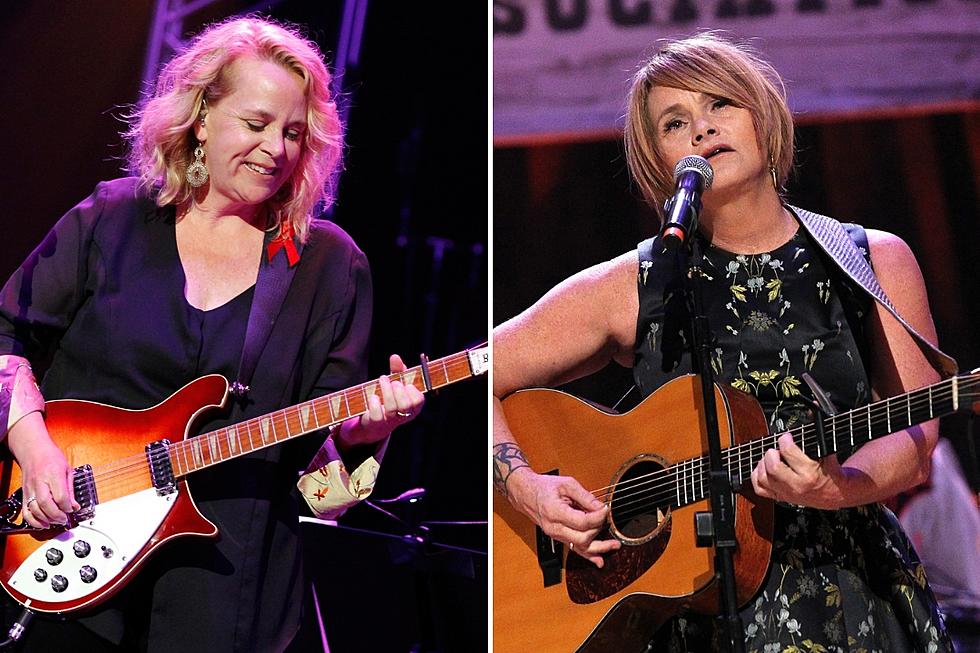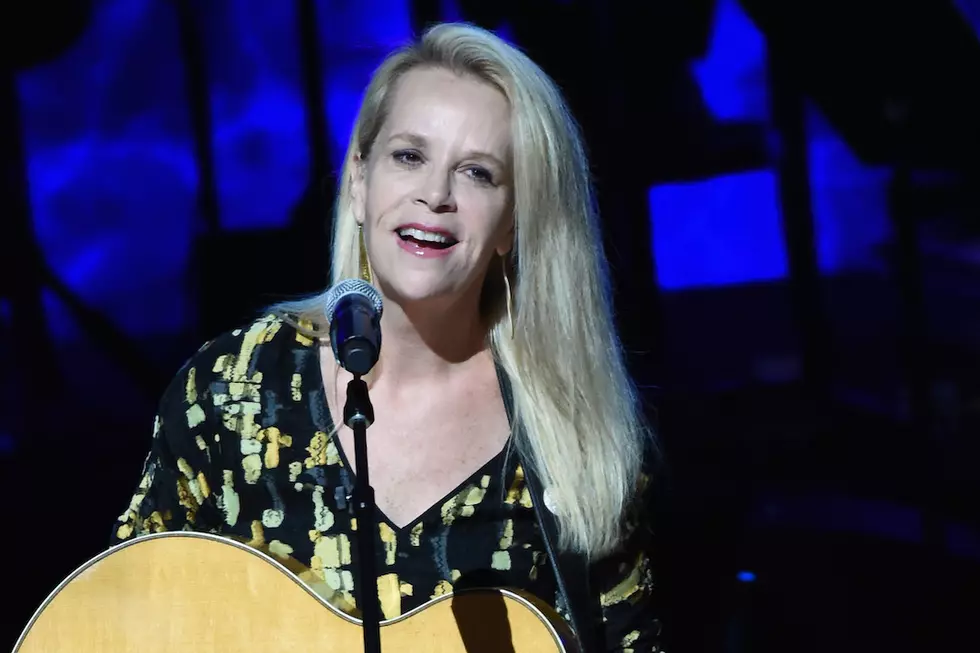
Mary Chapin Carpenter Interview: Grammy Winner Discusses New Orchestral Album + Tour
Mary Chapin Carpenter is one of the most intriguing success stories in country music. Despite a decided non-adherence to the rules of the commercial country format, the singer-songwriter has cultivated an enormous career that has seen her place hit singles, sell millions of albums, and win multiple CMA, ACM and Grammy awards.
Always one to follow her own artistic muse, in recent years Carpenter has turned her attention to less and less commercial fare, releasing highly acclaimed albums including 'Between Here and Gone,' 'The Calling' and 'The Age of Miracles.'
Her latest project, 'Songs From the Movie,' features Carpenter re-imagining some of her past songs in new orchestral arrangements. Recorded at Air Studios in London, and arranged and conducted by six-time Grammy Award winner Vince Mendoza, the album lives up to its title with sweeping, cinematic arrangements that reveal a new side not only to the songs, but to Carpenter's voice as well.
The Boot caught up with Carpenter by phone just days after the US debut of her new tour at the Schermerhorn Symphony Center in Nashville. The acclaimed singer's new show was a major artistic victory, and in the following interview, Carpenter talks about the long road to the new album and tour.
'Songs From the Movie' is an interesting title. Where did that come from, and how did the project come about?
I've had that title in my head for years. The idea for doing this project -- about 15 years ago, I was doing a fundraiser with Don Henley, and Vince Mendoza was the arranger of all of the songs. And that was the moment . . . I stood on stage and listened to everyone sing them, as well as my own songs that I got to sing, and I just thought, 'Oh my gosh, if I ever have a chance to take some existing songs and have them arranged for an orchestra, Vince would be the person, I would want to knock on his door to do it.' I found his work to be so beautiful and emotional.
The title, to me that was about his music; what's so beautiful about it is, it has a cinematic quality. And these songs, in his hands, have that sense of music from a film. It has that ability to transport you, to be very wide-open. Vince's work is beautifully pastoral.
Obviously there's no real movie, but that would be the feel, the spirit behind these renderings.
What took so long to actually get to an album, and why was this the right time?
[Laughs.] What took so long, I guess, is life and career goes many different places. I remember talking to the manager that I was with at the time that I first heard Vince's work, and it was like, 'Ah yes -- well, someday.' And I was involved in many different things. You just get to what you get to.
It's really, in my mind, a tribute to the great hard work and enthusiasm of the gentleman I work with now as a manager, Chris Tetzeli. We started working together about four years ago, and in our very first meeting together to talk, he said, 'Do you have a bucket list project? A project that you've been thinking about for years that you'd like to do?' And I said, 'Oh, that's easy.' I just started telling him about this, and he was the one who got it started, and of course, huge thanks to my record company that supported it.
Then from that point on, it took a long time as well to put all of the people together, and to get schedules right and book the studio. These things don't happen overnight. They take a while. I look back on it now and think, 'Gosh, the most wonderful things are worth waiting for.'
What struck me about the show at the Schermerhorn was, there's plenty of people singing orchestrated versions of their songs, but they're usually not remarkable. These are really, really exceptional versions of these songs.
I couldn't agree with you more. I agree with what you just said; I think people do this as a side project or whatever at times, and it can be, in certain hands -- I don't mean this in a terribly pejorative way, but the parts can be somewhat pedestrian, if they just stick really close to that song, and they don't have the ability to take it to a different destination.
I think the gift of Vince is his beautiful, amazing composing skills. But what he also did -- and I think it's very important -- when I sing these songs, I feel completely me. I feel very authentic. I don't feel like I'm now sort of trying to be somebody else inside of them. He has managed to create these beautiful, romantic passages in the music, and present them in such a way, but also my voice -- the singer, the protagonist if you will -- I'm still very much present, and I don't feel like I'm wearing some strange clothing, trying to present this music.
I appreciate you saying that, and I agree.
Were there any songs of yours that you wanted to re-visit in this way that just wouldn't work in different arrangements?
Well, that's been part of -- I feel like I've learned so much in the course of this project. The learning curve has been so interesting and challenging. Everything from the nuts and bolts of learning how to sing with an orchestra; being able to concentrate so hard and sing as precisely as possible, but also feel the emotion and not be a robot.
When we were going over the songs initially, I had a short master list, and Vince and Matt -- my other co-producer -- and I, we came together on the songs that we all felt we wanted as candidates. And one song I had selected, or thought would be a good candidate, Vince said, "You know, it's got a very sort of rigid, repetitive guitar part as the melody. I don't think I can expand on that in a very interesting way. It wouldn't be as interesting as some other songs." And I wouldn't have thought of that, but it made perfect sense to me once he said it.
I think any time you're excited about something and you want to put yourself on the line, it's worth it.
So certain songs absolutely didn't make the cut because they just wouldn't go anywhere different. And then also, people pick up this record and I think they expect to see 'Down at the Twist and Shout,' [laughs], or something. You can sort of put those clothes on any song, but that doesn't mean they're the best candidate. That's not what this record is about. It's trying to create more of a narrative, an arc. It wasn't about hits.
With the business being down in sales across the board, and with this being aimed at a more intelligent slice of the market, did you go into this with any trepidation about the financial side of it?
Any time you put a project out, every day, every new project is a risk. There's no guarantee about anything. Certainly you say to yourself, 'This is very different from anything I've ever done before. Is it worth it? Is there support for it?'
I had the support from my record company, and I had the support of the people I work with. As far as knowing whether it's worth it, you try to be as true as you can to yourself as an artist. I think any time you're excited about something and you want to put yourself on the line, it's worth it.
This has got to make the experience of touring very different. It's not a scenario where you can run down new songs in rehearsal and then toss them into the set later that night.
Absolutely not. The rehearsals are as physically challenging and mentally difficult as the show, in the sense that there's a lot of time spent on rehearsal, and you have to work very, very, very hard to get it going.
In Glasgow I actually had the advantage of, we had three rehearsals before the show. In Nashville, I got in the night before from Scotland and couldn't make the first rehearsal, and so I only had one rehearsal with the symphony before the show. Again, it's a testament to the wonderful gifts of the symphony that they were right there, right on, and it was beautiful.
I must say, Nashville's awfully lucky to have a venue such as the Schermerhorn, and to have such a wonderful symphony. I hope they get a lot of support from the community. It's one of the treasures of any community to have that kind of music offered.
One last question. If you were coming to Nashville for the first time today, do you believe you would have been able to have the career that you've had?
Oh my gosh, I think that's an impossible question to answer! [Laughs.] Things are so utterly different. There's no way to compare the world of today to the world that I encountered in the late '80s. The technology, the sense of what's on the radio and what's not -- there's too many variables.
One thing I will say about the world of today, I think what's so amazing about it, and so exciting, is that it really is a DIY world. Technology has given the ability to make a record, put it out there and show what you can do into everyone's hands, as opposed to there being gatekeepers at the record labels, and that would be the only avenue to getting people to know what you're doing.
I think it's just tremendously exciting, because it means it really is in everyone's hands.
Is there anything else that you would like to say about this project or your tour?
It's been one of the great experiences of my life to be able to present this music in this way. Every night that I get to sing with these amazing orchestras, and follow the baton of Maestro Mendoza, is an honor, and something I'll never forget.
More From TheBoot
![Mary Chapin Carpenter’s Best Live Shots [PICTURES]](http://townsquare.media/site/623/files/2019/06/mary-chapin-carpenter-singer.jpg?w=980&q=75)








